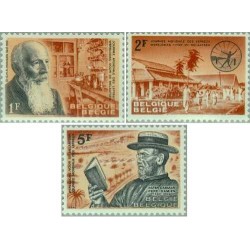- جدید
- ناموجود



Mexico 1970 - José Ma. Pino Suárez 1v
توجه : درج کد پستی و شماره تلفن همراه و ثابت جهت ارسال مرسوله الزامیست .
توجه:حداقل ارزش بسته سفارش شده بدون هزینه پستی می بایست 100000 ریال باشد.
José María Pino Suárez (Spanish pronunciation: [xosemaˈɾia ˌpinoˈswaɾes]; 8 September 1869 – 22 February 1913) was a Mexican statesman, jurist, poet, journalist and revolutionary who served as the 7th and last Vice President of Mexico from 1911 until his assassination in 1913. In 1969, he was awarded the Belisario Domínguez Medal post mortem. He dedicated his short life to fighting for democracy and advocating against social injustices in Mexico.
Born in the southern state of Tabasco, he moved at a very young age to Mérida, Yucatán, to pursue his education. Shortly after graduating from law school, he established a law firm and began to write his poetry, for which he was later offered a seat in the Spanish Academy. As an entrepreneur, he also established the newspaper El Peninsular in which he made the public aware of the social injustices occurring in the Yucatán peninsula at the time. Joining the pro-democratic cause of Francisco I. Madero, José Maria Pino Suárez was important in establishing the Antireelectionist party in the south of the Republic. Fighting against the political oligarchy that controlled Yucatán, and of which he ironically was a part of through marriage, he was declared candidate of the Antireelectionist party as Governor of Yucatán but was soon arrested by order of the official party. Fleeing from arrest, he joined presidential candidate Madero (himself fleeing from the oppression of the dictatorship of Porfirio Díaz) in the United States. There Pino Suárez helped to draft the Plan of San Luis Potosí, which declared the 1910 presidential elections to be null and void, and ignited the Mexican Revolution. Under the plan, Madero was declared substitute president and in his cabinet, Pino Suárez was declared Secretary of Justice.
Following the capture of Ciudad Juárez by revolutionary troops, Pino Suárez was one of the key negotiators and signers of the Treaty of Ciudad Juárez, which led to Porfirio Díaz resigning as president on 25 May 1911, and the end of his 30 year long dictatorship. Returning to Yucatán, Pino Suárez was declared interim governor by the local assembly after the resignation of Enrique Muñoz Arristegui. In the special elections of 1911 he won a majority of votes and was sworn in as Constitutional Governor of Yucatán. His term, however was short. Soon after his victory the Progressive Constitutional Party (a successor of the Antireelectionist party) nominated him as vice presidential running mate of Madero. On 15 October 1911, he won the vice-presidency with a comfortable majority and he was subsequently sworn in on the 6th of November by the Congress of the Union. In 1912 alongside the Vice-presidency, he was also selected as Secretary of Public Education.
In 1913, during the events of the Ten Tragic Days, a group of convicted army officers escaped from prison and launched a military coup against the President. Although at first the coup was unsuccessful in taking over the seat of the executive, Palacio Nacional, and was contained to one small area of the centre of Mexico City known as La Ciudadela, soon the General appointed to quash the rebellion, Victoriano Huerta entered into negotiations with the American Ambassador Henry Lane Wilson and with the rebels. Turning sides, Huerta soon captured the unsuspecting President and his entire cabinet. Pino Suárez who has been urged by many to flee the capital along with his family in case things came to worse, decided to remain by the side of the President while the usurpation was dealt with. Held in captivity along with the President in Palacio Nacional, both men were forced at gun point and under false premises to resign to their respective posts. Shortly thereafter, both were assassinated, provoking a national and international outcry that led to them becoming national martyrs. Pino Suárez has been labelled "el caballero de la lealtad" (the loyal gentleman) for his steadfastness to the President in such a difficult situation. Outrage for their deaths, was a main catalyst behind President Woodrow Wilson's decision to order the United States occupation of Veracruz in 1914, and in causing the fall of the unpopular Huerta Dictatorship, the last military dictatorship in Mexican history. Their sacrifice ultimately paved the way for the establishment of democracy in Mexico and for the promulgation of the 1917 Constitution.
| José Maria Pino Suárez | |
|---|---|
 |
|
7th Vice President of Mexico | |
| In office 25 November 1911 – 19 February 1913 |
|
| President | Francisco Madero |
| Preceded by | Ramón Corral |
| Succeeded by | Office abolished |
تشکر نظر شما نمی تواند ارسال شود
گزارش کردن نظر
گزارش ارسال شد
گزارش شما نمی تواند ارسال شود
بررسی خود را بنویسید
نظر ارسال شد
نظر شما نمی تواند ارسال شود

Mexico 1970 - José Ma. Pino Suárez 1v
check_circle
check_circle


















